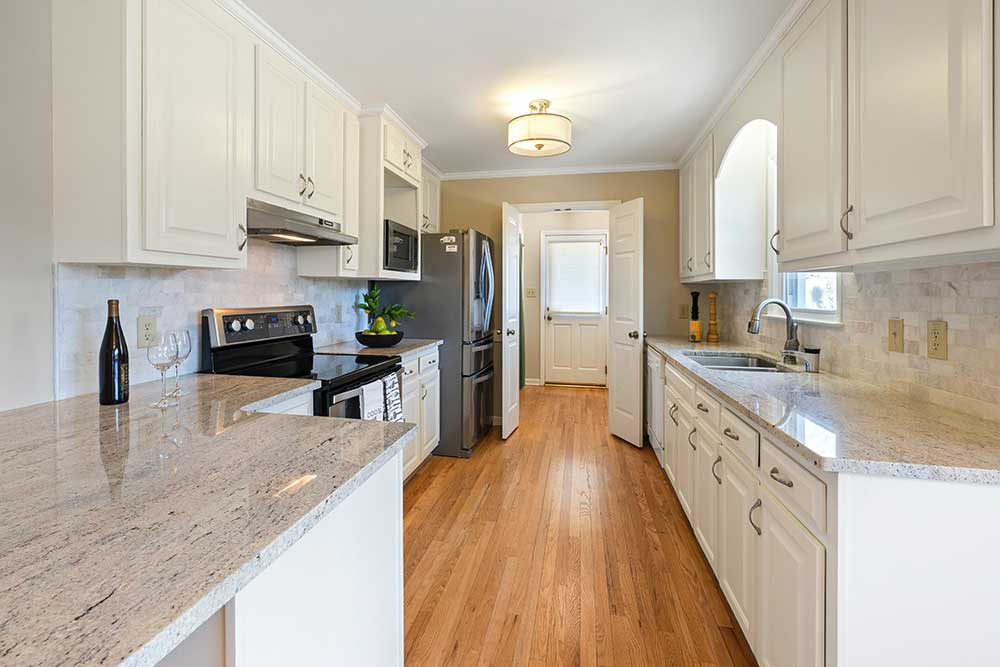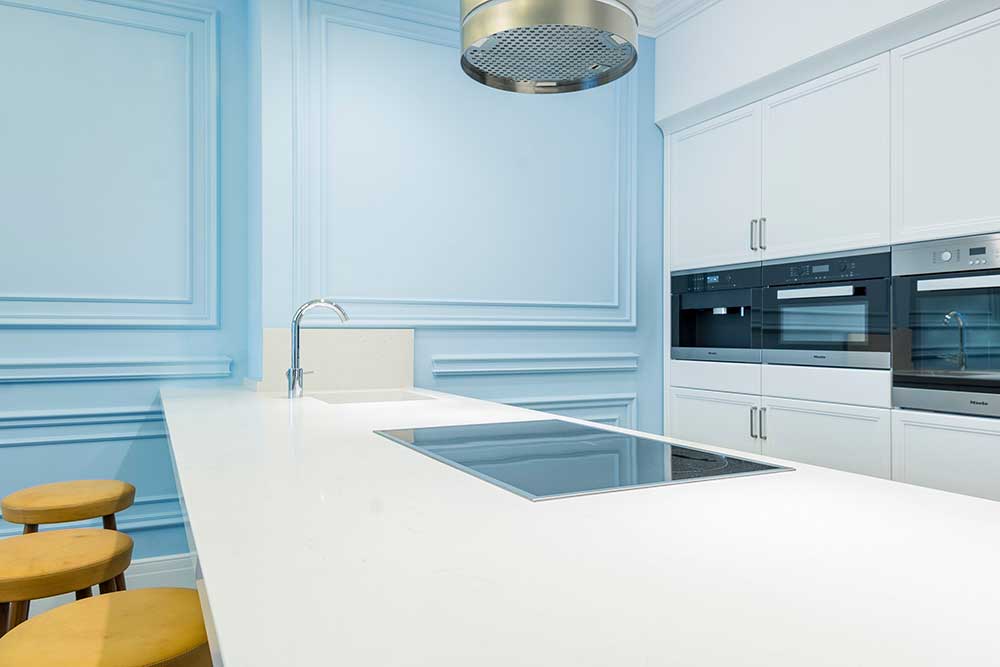Top 10 FAQs about Granite countertops
09, Nov 2022
Are granite countertops on your wish list for your new kitchen? Then you have come to the right place. You might have read a lot about granite countertops and their superior properties such as durability, low maintenance & of course brilliant design aesthetics.
We know that this is a significant purchase and that you want to first do your research. So, we have listed the 10 most common questions that will answer all your queries about granite countertops.
Let's begin this journey of knowing the basics of granite countertops.

1. DO CRACKS ON GRANITE MEANT THAT IT IS WEAK OR WILL BREAK?
Natural fissures that occasionally appear in granites with a crystalline structure are not structural flaws; rather, they are a product of the extreme heat and pressure that the granite underwent during its formation many years ago. Fissures do not constitute cracks and do not weaken the stone. Accidents that happen when handling, fabricating or transporting the granite from the quarry to your home are what produce cracks.

2. Can I USE KNIFE ON the GRANITE KITCHEN TOP DIRECTLY?
You can but you shouldn’t! True granite cannot be scratched by knives. Granite is only surpassed in hardness by diamond and the only item that can efficiently cut through granite is a diamond blade. Cutting directly on the granite's surface won't harm it. However, we advise against doing so as any knife you use can easily get dull or damaged.

3. What is the difference between granite & quartz?
Quartz and granite both work well for countertops. They aren't the same, though. The primary distinction between quartz and granite is that the former is an artificial, constructed substance, whilst the latter is a natural product of the soil. This implies that while certain quartz varieties resemble granite, most of them look and act very differently.
4. Do granite countertops of all types require sealing?
No, only the porous ones. The porosity of this stone varies from quarry to quarry and from slab to slab even though it is the hardest stone known to man. However, this characteristic can be quickly verified by drizzling some water on it in a discrete area. Countertops do not require sealing if they are left unattended for 30 minutes. If the countertop absorbs quickly, it needs to be sealed.
5. How can I tell when to seal my countertops and what exactly is a sealer?
A countertop sealer is similar to a protective coat. Natural stone is somewhat absorbent and can be either dense or porous. More swirls or veins in a stone usually mean that it is porous and absorbent. A sealer will lessen the possibility of something damaging or staining your surface. Granite countertops are easy to clean & maintain, and resistant to stains sealing them properly will make your life even more comfortable & convenient.
6. How can I keep my countertops from getting cracked and chipped?
Avoiding excessive activity on the edge of a countertop and reducing heat exposure are two ways to reduce cracks and chips. Never place a hot pot or pan directly on your stone; always place a trivet between the two. Your stone surface may get weaker and crack as a result of being exposed to heat.
7. How easy is it to maintain granite countertops?
Low maintenance of granite is one of its best advantages. Simply use a solution of mild soap and water to wash off your granite counters, or you may use an ammonia-free window cleaner. This will keep them looking brand-new for many years. To clean up spills, dab them with a paper towel rather than wiping them. If a stain is present (which is unlikely), wash the area with a solution of plain water and mild soap. Then use a soft cloth to dry the spot. Repeat as necessary.

8. Is Granite stone porous?
Granite, like many natural stones, is porous despite its tremendous hardness. This means that even though it is a rock, there are tiny holes on its surface where germs can hide, even though it is technically impregnable.
You can seal and safeguard your countertops to keep them clean and in pristine condition. Clean the stone with a special granite cleaner, and seal it at least once every five years to prevent stains and maintain its luster.
9. Where does Granite come from?
Granite is mined from the earth at quarries. It must be processed once it is mined since it is quite raw. The granite will be carved and polished to a shine by a professional using unique milling equipment. Final slabs are developed once that process is complete. We at Aryan Tiles have built a strong infrastructure where we process quality granites from the quarry to the slab.
10. Is Granite a Good Investment?
When you want to improve your home's functionality and market value, granite is a great choice. This one-time purchase will pay for itself many times over because it may be moved and used again if you decide to remodel or improve in the future. It is also available in a wide variety of varieties, from our P white granite to Galaxy black granite, making it a flexible and adaptable addition to your home.
It's also one of the most affordable options available compared to other quality surfaces, offering a strong ROI you'll value for years.
We hope you feel confident about granite as now you have a better understanding of the origins of granite, how it functions, and how to take care of your granite. Feel free to move ahead with your kitchen or bathroom project now that you have this knowledge in your possession. But if you still have any doubts, we have got you covered. Send us your query at info@aryantiles.com or call or WhatsApp us at + 91 - 637 797 0211
Wondering where to begin?


 Address:
H42C & H43F, RIICO Industrial Area, Chirawa, Rajasthan 333026
Address:
H42C & H43F, RIICO Industrial Area, Chirawa, Rajasthan 333026 +91 637 797 0211
+91 637 797 0211